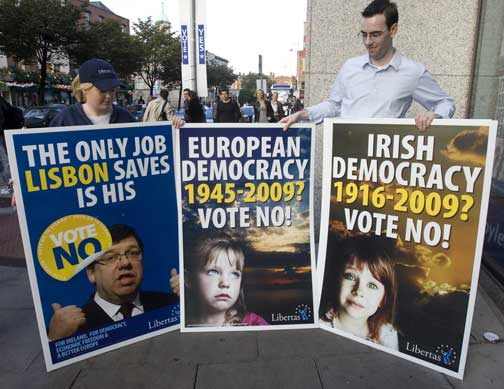


SERVICES
Tuesday September 29, 2009
Just Say 'No'... Again!
Libertas supporters with the new posters for the second vote (Photocall) In less than a week's time, on October 2nd, the Irish will again be the only Europeans allowed a vote on the 'new' Lisbon Treaty. We urge all our readers who are registered and eligible to vote in this referendum to again register a 'No' vote. While membership of the European Union has been an overall benefit for Ireland, this does not mean that accepting further moves towards the federalization of Europe and the removal of more powers from your elected officials in the Dáil, transfering them to unelected bureaucrats in Brussels would be good for Ireland in the longer term. It should not be forgotten either, that the process by which the Lisbon Treaty came into being was simply another example of the E.U.'s contempt for the democratic process. After finding themselves with a European Constitution that was rejected by voters in France and the Netherlands, they simply cut-and-pasted the document together in a different format and gave it a nice new, supposedly voter-friendly name - the 'Reform Treaty' - then relied on the national government's unwillingness to risk their voters rejection in the polling booth (the most egrarious example being that of the U.K. where the Labour government promised a referendum in their election manifesto in 2005 and then abandoned their pledge after they were returned to power). Then when Ireland voted 'No' in the first referendum, the powers that be repeated the tried-and-tested plan of simply holding more referendums ad infinitum, or at least until they get the answer that they want - at which they'll have got what they need and they'll never hold another vote. Some will contend that the Lisbon Treaty is not the European Constitution, but they ignore the statements of politicians across Europe. Angela Merkel, the Chancellor of Germany let slip the truth when she said, "The substance of the constitution is preserved. That is a fact." Or how about Giuliano Amato, the vice-chairman of the convention responsible for drawing up the Constitution in the first place. He was surprisingly honest for an E.U. bureaucrat, saying, "The good thing about not calling it a constitution is that no one can ask for a referendum on it." If the voters of Ireland - who are in the unique position of being the only peoples in Europe who can stop the ratification - vote 'Yes' next week, then they will begin the biggest transfer of political power from the nation states to the centralised bureaucracy. If the treaty is ratified, more than 60 areas of national policy will no longer be decided by consensus. Instead a simple majority of nations will set the agenda and policy for all states within Europe. Presumably these are areas of policy of limited impact? Policies that should rightly be controlled by the new European "super-state"? Will you decide to allow the powers-that-be take the road to a undemocratic super state where decisions are taken by unelected committees in Brussels or will you vote for a democratic Europe where you can vote your national leaders out of power if they fail to deliver on their promises? Now, politicians that support the European Constitution Reform Treaty Lisbon Treaty will say that they have cast-iron guarantees that Europe will not interfere with Irish domestic policy on taxation, they'll never remove a nation's Commissar Comissioner, etc., etc. Of course, they've given the same guarantees before, yes, legally-binding ones. But once the treaty's signed, sealed and delivered, the central European bureaucracy has all the powers it needs to change legal guarantees, remove policy areas from consensus voting to a simple majority or simply, as in the case of the 'working hours directive' opt-out for Britain, simply hold a vote in the European Parliament. Irish voters have been given a unique opportunity to set the future direction in Europe. Will you decide to allow the powers-that-be take the road to a undemocratic super state where decisions are taken by unelected committees in Brussels or will you vote for a democratic Europe where you can vote your national leaders out of power if they fail to deliver on their promises? The question may be being asked a second time, but the answer is no less relevent for Irish democracy. |
CURRENT ISSUE

RECENT ISSUES


SYNDICATE
[What is this?]
POWERED BY

HOSTED BY

Terms of Service | Privacy Policy
Website Design By C3I






